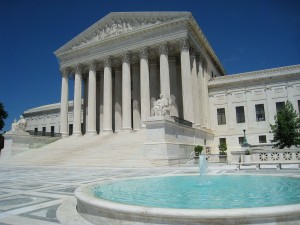Top Federal Appeal Lawyers: Professional Legal Advice for Your Federal Appeal
Top Federal Appeal Lawyers: Professional Legal Advice for Your Federal Appeal
Blog Article
Demystifying the Refine of Federal Appeals: What You Required to Know
Browsing the elaborate world of federal charms can usually appear like passing through undiscovered waters for those not familiar with the procedure. Recognizing the nuances of appellate court jurisdiction, the ins and outs of submitting a notice of charm, offering a compelling short, and making an influential dental disagreement are essential parts that can considerably influence the outcome of a situation. By deciphering the layers of intricacy bordering government charms, individuals can get a more clear understanding into the systems that regulate this essential phase of the legal system.
Understanding Federal Appeals Process
Diving right into the detailed realm of the federal allures process unveils a methodical and organized trip through the judicial system - federal drug trafficking appeal lawyers. Federal appeals work as a critical device for examining decisions made by reduced courts. Understanding this process is important for any individual associated with legal procedures at the government degree
The process usually starts with an event disappointed with a lower court's judgment submitting a notice of charm. This triggers an evaluation by a higher court, where a panel of courts analyzes the legal debates provided by both events. Briefs outlining the legal reasoning behind each event's position are sent, and dental disagreements may be heard to clarify intricate problems.
The appellate court's choice is based on a complete assessment of the lower court's proceedings and the disagreements offered. When the appellate court gets to a decision, it can verify, turn around, remand, or modify the lower court's ruling, offering clarity and finality to the lawful dispute.
Appellate Court Jurisdiction Explained

Appellate courts have jurisdiction over certain kinds of cases, commonly those including legal mistakes, procedural concerns, or questions of regulation as opposed to valid conflicts. The territory of appellate courts is typically described in laws and legislations that govern the court system. Understanding appellate court jurisdiction is vital for parties associated with the appeals process as it establishes whether a case is eligible for evaluation and the extent to which the appellate court can intervene in the lower court's decision.
Declaring a Notification of Allure
The initial action in commencing the federal allures process involves filing a Notice of Allure with the proper appellate court. little rock federal criminal appeal lawyers. This important paper officially notifies the court and the other celebrations entailed in the instance that the appealing celebration plans to look for an evaluation of the reduced court's choice. Filing a Notification of Allure is a stringent step-by-step demand that establishes the appellate process moving
When preparing the Notification of Allure, it is essential to ensure conformity with the certain guidelines and guidelines of the pertinent appellate court. The paper needs to normally include details such as the instance name, the reduced court's name, the date of the judgment being appealed, and a concise declaration suggesting the grounds for the appeal.
Timeliness is important when submitting a Notification of Allure. Missing the target date for submitting this record can lead to the charm being rejected, highlighting the value of prompt and precise initiation of the charms procedure. It is advisable to seek legal assistance to navigate the intricacies of filing a Notification of Appeal efficiently.
Rundown and Dental Argument
In the appellate process, providing composed briefs and participating in dental disagreements play essential roles in supporting for the appealing celebration's placement before the appellate court. Briefs are thorough lawful documents that outline the events' debates, legal authorities, and analysis sustaining their placements. These created entries provide the court with a comprehensive understanding of the truths of the instance, the pertinent law, and why the appealing party believes the reduced court's choice need to be reversed.
Adhering to the entry and testimonial of the briefs, oral arguments use the events a chance to further clarify their positions, address any type of questions the appellate judges might have, and highlight essential points from their created briefs. Oral arguments are an opportunity for the attorneys to persuade the judges with verbal campaigning for and reactions to questions from the bench.

Obtaining the Appellate Court Decision

Final Thought
Comprehending the appellate court territory, submitting a notification of allure, preparing briefs, and offering dental arguments are all important parts of this process. Inevitably, getting the appellate court choice can offer quality and resolution to legal conflicts.
As we progress from comprehending the government charms process to dissecting the complexities of appellate court territory, an essential aspect comes to light pertaining to the authority and limitations of these higher courts in the legal landscape. Appellate court territory refers to the range of instances that a particular appellate court has the power to determine and review upon. Unlike test courts that listen to situations for the first time, appellate courts are restricted to reviewing choices made by lower courts. Comprehending appellate court territory is vital for parties included in the appeals process as it establishes whether an instance is qualified for evaluation and the extent to which the appellate court can interfere in the reduced court's choice.
Whether the appellate court attests, reverses, or remands the reduced court's decision, understanding the effects of the ruling is crucial for all events included in the appellate procedure.
Report this page